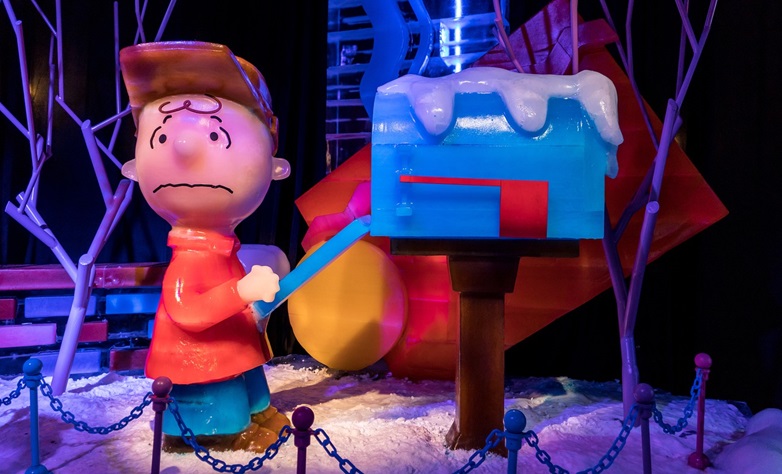Are you tired of toxic positivity during the holidays? Is there anything about our festivals of lights that dispels the darkness?

During the holiday season, windows shine with candles and boast beautiful bows. Icicle lights suspend from the eaves, while bushes lay covered with glittering electric snow. The air is filled with the sound of doorbells and sleighbells, and the aroma of schnitzel with noodles. Snowflakes stay on your nose and eyelashes, and all your favorite things make you not feel so bad when calamity comes. But this jolly strategy doesn’t work for everybody.
Many grow tired of holiday cheer, exclaiming that our festivals don’t dispel the world’s darkness. Is there such a thing as toxic positivity? Of course, there is. But are the holidays guilty of propagating toxic positivity? I would answer I would answer no—but with a caveat.
Lighting the Darkness
Christmas is the celebration of the Great Light who came into the world. Jesus described himself as the “light of the world.” The Gospel of John says, “The light shines in the darkness, and the darkness did not overtake it.” The whole point of the Gospel (Good News) is to bring light, salvation, and positivity into a dark world. When Christians light up the tree, they do more than decorate their homes. They recall and invoke the light of Christ.
Christianity isn’t alone in shining a light in the darkness. Before missionaries spread their faith to Europe, Yule was the Celtic and Germanic celebration of the shortest day and the longest night of the year. Moving forward, the days only get longer and brighter. In European paganism, the Yule log burns brightly to remind us that no matter how dark things get, we will see the light again.
Judaism shares the tradition of lighting the darkness during this time of year. Hanukkah is called the Festival of Lights, celebrating the temple’s rededication after the Maccabean war. Jewish celebrants share food, gifts, and games. They recall the miracle of God allowing a small vial of oil to burn for eight consecutive days to reconsecrate the temple after its desecration. The menorah’s eight candles represent this astonishing event. They represent the hope that light brings to the darkness.
Many others join the tradition of lighting the winter darkness. Those who celebrate Kwanzaa light the candles of the kinara to call upon the virtues of unity, self-determination, collective work and responsibility, cooperative economics, purpose, creativity, and faith. Like Hanukkah, Diwali is also called the Festival of Lights. People observing Diwali light the diya (oil lamp) to banish evil and darkness and to welcome luck, prosperity, wealth, and success. These great traditions have one thing in common—light overcoming darkness.
In troubling times, we need light and positivity to see us through. Otherwise, the darkness of war, sickness, death, poverty, addiction, hopelessness, and despair would overwhelm us. Just as a person with Seasonal Affective Disorder needs a happy lamp to get the right energy that sees them through the darkness, we need holidays like Christmas, Yule, Hanukkah, Kwanzaa, and Diwali to help us shine through the night. These holidays do not promote toxic positivity. Instead, they offer love, joy, hope, and peace to a hurting world.
Toxic Positivity During the Holidays
Some people use the term “toxic positivity” to describe artificial happiness that masks depressing reality with a smiling face. What they fail to understand is that sometimes you need a few of your favorite things just to make it through. If our problems were limited to dog bites and bee stings, we would have far less reason for concern. But life throws so many devastating darts that perhaps we need a little Christmas now.
No, positivity isn’t toxic. However, we should be more conscious of meeting hurting people where they live. Many folks can identify with Longfellow who wrote, “And in despair, I bowed my head. There is no peace on earth, I said. For hate is strong and mocks the song of peace on earth, good-will to men.” A lot of people feel these raw emotions during the holidays. While holiday lights offer enchantment and hope for some, for others they seem a false light that only accentuates the darkness.
Positivity is helpful when we want to shift our own focus to joy instead of sorrow. But it becomes toxic when it becomes a way to cover other people’s suffering. Once I knew a man whose daughter struggled with dysthymia. His frequent and brusque advice was, “Just feel better!” It was his way of saying, “I don’t want to deal with your emotions right now. I don’t want you bringing me down. So instead, I’m going to act like all you need is to snap your fingers and things will be all right.”
This is toxic positivity—to act like a person can slough off depression like dead skin in the shower, by simply remembering your favorite things. Holiday cheer may be alright for you, but it becomes toxic positivity when you impose it on others as the sole solution to their misfortune or pain. If your festivities bring you joy, then, by all means, deck the halls! But don’t turn a good thing into a bad one by calling someone a Grinch simply because they’re having a tough time making merry.
Meet People in Pain to Bring Them into Your Joy
Positivity isn’t toxic until, instead of offering real solutions, it simply serves as a cover-up for pain. Your holly jolly Christmas may be just what you need during these darkest days. There’s nothing wrong with enjoying that. But make sure you’re taking the time out from your festivities to address the real pains of others around you. Only by meeting people in their pain can you ever hope to bring them into your joy.














